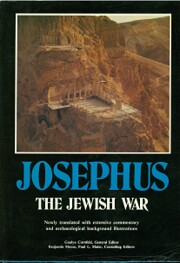

Click on a thumbnail to go to Google Books.
|
Loading... Josephus, the Jewish War; Newly Translated with Extensive Commentary and Archaeological Background Illustrations (edition 1982)by Gaalyahu Cornfeld (Other Contributor)
Work InformationThe Jewish war by Flavius Josephus
 No current Talk conversations about this book.   ) )Josephus’ account of a war marked by treachery and atrocity is a superbly detailed and evocative record of the Jewish rebellion against Rome between AD 66 and 70. Originally a rebel leader, Josephus changed sides after he was captured to become a Rome-appointed negotiator, and so was uniquely placed to observe these turbulent events, from the siege of Jerusalem to the final heroic resistance and mass suicides at Masada. His account provides much of what we know about the history of the Jews under Roman rule, with vivid portraits of such key figures as the Emperor Vespasian and Herod the Great. Often self-justifying and divided in its loyalties, The Jewish War nevertheless remains one of the most immediate accounts of war, its heroism and its horrors, ever written. The story of how and why the Romans destroyed Jerusalem in 70 AD four years after a Jewish revolt. The first third of the book is the history of Jerusalem from the middle of the 2nd Century BC to 66 AD. Then in a choice of spectacular short-sightedness they revolted against the Romans and, well, what did you think was going to happen? no reviews | add a review
Belongs to Publisher SeriesEveryman's Library (712) The Folio Society (The Destruction of the Jews) Penguin Classics (L090) — 1 more Is contained inContainsIs retold inIs abridged inHas as a student's study guide
The Jewish War is an extraordinary historical document in that it details a calamitous period of four years during which the Jews pitted themselves against the might of the Roman empire. It is partly a remarkable account in that its author, Flavius Josephus (c.37-c.100 CE) was himself a Jew and yet, during the course of the conflict, found himself playing a prominent role for both sides. It is further underpinned by the fact that Josephus himself was not only a participant, but also an historian and a scholar of standing. Few such accounts from the Classical period have survived to this degree, and it makes the whole story intensely vivid and powerful. The Jewish War actually ran from 66 CE to 70 CE, culminating in the fall of the Jerusalem. But Josephus begins his account decades back, with the purpose of setting the background. Book I (of seven) opens with the taking of Jerusalem by Antiochus Epiphanes in 167 BCE, before devoting the major part of Book I to the life and influence of Herod the Great who died in 4 CE. It was his complicated legacy that laid the ground for the uprising of the Jews. In Book II, Josephus tells how the Jews rose up against violent treatment by the Roman procurator, Florus; how early success against Cestius encouraged the Jews in the hope of ultimate success against the Roman Empire. The succeeding books tell of the gradual dominance by the Romans, under Vespasian and then his son Titus. Torture, starvation, banishment and slaughter became commonplace across the theatre of war. The gradual weakening of the Jews was not helped by internecine strife of a horrendous nature - even within Jerusalem itself when it was being besieged by the Roman army. There could be only one conclusion - the utter destruction of Jerusalem, with the final scene of the war being the infamous mass suicide at Masada. Josephus records his own role, leading the defence in the early days, notably building strong walls around various cities. But as months and years passed, he realised that the Jewish cause would never win against the might of Rome. This powerful account was written in 75 CE probably either in Aramaic or Hebrew, but it has survived in a Greek version. This recording uses the classic translation by William Whiston. PLEASE NOTE: When you purchase this title, the accompanying PDF will be available in your Audible Library along with the audio. No library descriptions found.
|
Current DiscussionsNonePopular covers
 Google Books — Loading... Google Books — Loading...GenresMelvil Decimal System (DDC)933.05History & geography History of ancient world (to ca. 499) Palestine to 70LC ClassificationRatingAverage: (3.94) (3.94)
Is this you?Become a LibraryThing Author. |
||||||||||||||||||||||||||||||||||||||||||||||||||||||||||||||||||||||||||||||||||||||||||||||||||||||||||||||||||||||||||||||||||||||||||||||||